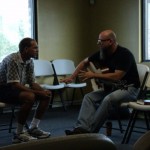The church is not the institution. The institution is not the church.
The title of this post came from my good friend Eric at “A Pilgrim’s Progress” and his post “Not the Same.”
In the post, Eric is making a distinction between the church and the organizations and institutions that are often created by the church. I think this is an important distinction. Why is it important? Because these organizations and institutions (in all of their varieties and flavors) tend to overshadow and even hinder the work of the church.
Eric writes:
The church is not the institution. The institution is not the church. They are not the same. In fact, they are fundamentally different. The first is God’s creation. The second is man’s. They not only differ but in many ways oppose each other.
This has become increasingly clear to me over the past few months. It has helped me in discussing the things of the church. For quite a while I’ve been frustrated with the way things at large are going within the church in this country. This was because I saw so many man-made traditions shackling the life of the church. It all seemed like one big jumbled mess to me.
Yes, it is “one big jumbled mess.” And, it is often confusing to the people involved. What part is the church? What part is the organization? What part is of God and what part is of man? It really is “one big jumbled mess.”
Please take the time to read the rest of Eric’s post. I agree with him that understanding that there is a difference between the church and the organization/institution is the first step in recognizing the church.
Then, what happens when we DO recognize the church? At this point, brothers and sisters in Christ make different decisions. Some decide to separate from the organization/institution. Some decide to continue with the organization/institution. Perhaps others make other decisions.
For me, the important part is living in Jesus Christ with the church – either with the help of or in spite of the organization/institution.
Which decision have you made, and why?
Guest Blogger: Stumbling Behind Jesus
I’ve invited several people to write “guest blog posts” for this blog. There are several reasons for this: 1) To offer different perspectives. 2) To generate even more discussion and conversation between blogs. 3) To introduce other bloggers to my readers.
(If you are interested in writing a guest blog post, please contact me at aknox[at]sebts[dot]com.)
Today’s post was written by Scott Eaton. You can follow Scott on Facebook or on Twitter (@scottweaton).
————————————
Stumbling Behind Jesus
When setting up my Facebook page a few years ago it asked me to identify my religion. I sat there for a moment contemplating this question. You’d think it would be easy for me, but it wasn’t. I mean, really, what’s the hang up? I’m the pastor of a Christian church and a Baptist one to boot! But for some reason the question bothered me.
I suppose there were many reasons for this. First, I don’t really like “religion” at all. I’m not very good at it. Rules and rituals stifle and bore me. I can get into it for a little while, but after a bit I begin to just fall into a lifeless and legalistic…religion. I’m pretty sure Jesus didn’t call us to a religion but instead called us to Him. There’s a very big difference.
Secondly, I thought about putting down Christian. That does make sense, doesn’t it? After all, I am a Christian. If asked to check a box on one of those forms (like at the hospital) describing your religion I wouldn’t check Jewish, Muslim, Hindu or other. I’d in good conscience and with great conviction check Christian! Of course I would. So why not describe myself as Christian on Facebook? I’m not sure except it seems to me that most of the people in the USA who believe in God would describe themselves as Christian whether or not they genuinely are. I know that before truly coming to Christ I would have described myself as a Christian just because I grew up in a so-called “Christian” church. I suppose this is why Christian would not do.
Thirdly, I seriously considered placing some adjectives in front of the word Christian. Something like: evangelical, Baptist, Bible-believing, somewhat Reformed, conservative-moderate, free-thinking Christian. But this seemed kind of ostentatious, which is not a flattering characteristic of a Christian. So I figured I’d better keep thinking about it.
Fourthly, I thought about calling myself a Follower of Christ under the religion section on Facebook. Ah, yes, this would work! This is the goal of my life – to follow Jesus Christ! This gives more clarity to those who wonder. It makes more sense than just Christian (even though I unashamedly refer to myself as a Christian too). Christ-follower, that works. But something seems too confident in that assertion. It makes me appear as more than what I really am and makes my following of Jesus to be better than it really is. So I had to think of something else.
Finally, I got it. Under my religion I simply put: Stumbling behind Jesus. Why? Because this is what I do. I am a Christian who does follow Jesus. But follow Him perfectly – no way. My following of Jesus is more like stumbling. Stumbling is the right word. If Jesus were a trail guide leading me up a mountain path I would at times be there right beside Him, enjoying the conversation and scenic views. But more often than I care to admit I would trip over a rock on the path and stumble. Sometimes falling and sometimes falling hard. Instead of scenic views I lie bloodied in the dirt. At other times I feel like I can’t keep up with Jesus and never will. I have to stop and sit for a while in order to rest. Fortunately in those moments I hear Jesus say, “Scott, come to me, you who labor and are heavy laden, and I will give you rest.” And He does. He picks me up and carries me along, helping me to follow Him again. It is His grace and strength that are sufficient in my weakness.
I’m very grateful that God says in His Word, “The steadfast love of the LORD never ceases; his mercies never come to an end; they are new every morning; great is your faithfulness” (Lamentations 3:22-23). This is a great comfort to one who stumbles like me. But sometimes I’m afraid that I’m the only one who stumbles behind Jesus, even though I suspect it isn’t true. Sometimes I wonder if I’m the only one who loves Jesus and earnestly wants to follow Him, but finds it hard to read the Bible, hard to pray, hard to love, hard to serve, hard to sacrifice and hard to tell others about Jesus. I love Jesus but my flesh screams against these things. I know there are many followers of Christ out there who really love Jesus, but are there any other stumblers like me?
Maybe you’re reading this and thinking, “Yes! Stumbling behind Jesus describes me too!” You love Jesus, you follow Jesus, but you stumble. Maybe there are more of us than I think. Perhaps this is where Jesus wants us to be. Perhaps admitting our stumbling is the beginning of humility, contrition, and dependence that I believe God desires in us (cp. Isaiah 66:2; Isaiah 57:15).
Is it possible that we who stumble behind Jesus should just admit it and then we can all stumble together? When one stumbles another can help him up! When one falls, another can tend to his wounds. When a brother or sister is spiritually weak maybe we who are at that moment “spiritual” could help them in their weakness (Galatians 6:1). Is it possible that by stumbling together we might stumble less and actually become stronger, more faithful followers of Jesus? Is it possible that in this way we are the hands and feet of Jesus to one another? Wow.
Maybe it’s just me, but it almost sounds like this is what the church is supposed to be. “Let him who has an ear, let him hear.” Amen.
Scripture… As We Live It #203
This is the 203rd passage in “Scripture… As We Live It.”
One person esteems one day as better than another, while another esteems all days alike. Each one should be fully convinced in his own mind. But, only accept those who esteem (or do not esteem) the same days as you. (Romans 14:5 re-mix)
(Please read the first post for an explanation of this series.)
Replay: Meeting Around the Table of the Lord
Two years ago, I wrote a post called “Meeting Around the Table of the Lord.” The described our church gathering on Easter morning, when we gathered together “to break bread.” The Lord’s Supper was not a piece a bread and sip of juice tacked on the end of our meeting. Instead, our meeting was centered on sharing a meal together.
Here is the post:
——————————————
Meeting Around the Table of the Lord
I’ve written several times on this blog about the Lord’s Supper, or Communion, or the Eucharist, or whatever you want to call it. I’ve talked about how the Lord’s Supper is described as a meal in Scripture. I’ve also written about how we usually eat together when we gather with the church.
Still, though, there has usually been a disconnect between our meeting together, the bread/cup, and eating a meal together. I’ve often thought about how this disconnect could be remedied.
Last Sunday – yes, Easter Sunday – we had an opportunity to meet in a different way that brought together the bread/cup, a meal, and our whole meeting.
We began by meeting around tables. People knew that we would be eating together, so they brought food with them – rows of crock-pots, casseroles, dishes, and other assorted goodies. We then milled around and talked and discussed our week and different things like that.
Eventually, one of our brothers started leading us in some singing. Since it was Easter, and since we were planning to study the resurrection passage in Matthew 28:1-17, we sang several songs about the resurrection. We’re also reading through Acts together, so at one point two brothers read from Acts 18, one reading the first half of the chapter, and another reading the second half of the chapter.
After a few songs, we talked about the significance of the bread and breaking the bread. We talked about how the bread signified both Jesus’ broken body as a sacrifice on our behalf, and how the broken bread signifies the beginning of our meal with Jesus as our risen, living host. It remains his table, not ours.
Since I was planning to lead our discussion of Matthew 28:1-17 that morning, I suggested several questions that people could discuss together around their tables as they were eating.
Then, after we broke and shared the loaf of bread together, we began eating. As we ate, we discussed the questions that I suggested. After most people had finished eating, and while a few were finishing dessert, I asked each table (we had five tables) to share something about their discussion.
Next, I read and led a discussion of Matthew 28:1-17. Of course, our discussion around the table led into this teaching/discussion. Since people had already been talking about the issues in smaller groups, it seemed our larger group discussion was even more open and focused on the topic.
Finally, after a few announcements, we passed around the “cup” (actually a bottle of grape juice) and shared this together.
There are many ways for the church to meet together. I really appreciated the way we met together last Sunday. I liked the way that our meeting format combined the bread, cup, meal, and teaching all together in a unified format. The bread/cup and meal were not “tacked on” to the meeting, but were an integral part of our meeting together.
So, what’s the deal with all this pastor stuff?
Over the last few days, I’ve written several posts related to pastoring, pastors, and “pastors.” By pastoring, I’m referring to caring for God’s people, helping them, serving them, sharing your life with them. By pastors, I’m referring to people who spend time pastoring others. By “pastors,” I’m referring to people who have been given (or who have assumed) a certain title in a church organization.
(By the way, some “pastors” are pastors. Some pastors are not “pastors.” Are you confused yet? I hope not.)
Some of the posts this week were planned – posts such as this one, and “The dangers of ‘pastoring’ hundreds or thousands,” and “A little about my pastors.” Some of the posts this week were unplanned – that is, they were links to posts that I’ve read recently that happened to touch on the same subject, such as “But he has an MDiv and ordination papers,” and “What pastoring is NOT.”
So, why have I spent this week writing about pastoring, pastors, and “pastors”? Am I angry about church leadership? Do I have a grudge against people with the title “pastor”?
No, I’m not angry, and no, I don’t have a grudge against anyone with the title “pastor.” Some of my good friends have been given the title “pastor.”
So, why have I spent this week writing about pastoring, pastors,and “pastors”?
I care about the church, and I love to see God people grow and mature in their faith in God, in unity with one another, and in their walk with Jesus Christ. From my experience, the different between someone who pastors others and someone with the title “pastor” often causes problems in Jesus’ church – problems that hinder the kind of growth and maturity that I mentioned earlier.
So, I wrote these posts for two audiences:
1) I wrote these posts for those who have been given or who have assumed the title “pastor.” You have the title, but do you actually spend time caring for and serving other people? I know your initial answer is, “Yes.” But, I’m asking you to look deep down, into your own life and into the lives of those around you. If you do not know them well enough to look into their lives, then you are probably not pastoring them. Start caring for God’s people – even if it means that you can’t do the things that people expect from a “pastor.”
2) I also wrote these posts for those who do not have the title “pastor.” Guess what? You are still called by God to pastor others. God desires all of his children to spend time with one another, to share their lives with one another, and to help one another grow in maturity in Jesus Christ. This is pastoring, and God will do this work through you if you will allow it. Do not wait on people with titles to start caring for others. Start caring for God’s people now.
It really is that simple. Oh, it won’t be easy, and you will probably face opposition – even from those who should be your friends.
But, start pastoring God’s people anyway. Then, watch in amazement what God does through you. The people are his flock anyway. He wants to work through you (and others) to care for them. Give him the opportunity.
What pastoring is NOT
Continuing my (unintentional) series on pastoring, I want to link to a new blog site (for me). I noticed this site because of a link to my post “The dangers of ‘pastoring’ hundreds or thousands.”
The post I’m referring to was written by Reuben at “Phoenix Preacher” and is called “Christ is the Head of the Church. Period.”
While Reuben’s post focuses on one particular (celebrity) church leader, I would like to point out a more general section where he discusses what pastoring is NOT:
This needs to be clarified by maybe discussing what a pastor is not. A pastor does not lock himself in an office and study for 50 hours a week while “elders and deacons” or simple pew pigeons are out doing the ministry. That is what you call a paid theologian. Case closed. A pastor does not spend his days in the back of a coffee house running up the church credit card while blogging and facebooking all week. A pastor does not take off on 6 month book tours, speaking at every church in the country but his own. These are bloggers, or professional speakers, but not pastors. A pastor does not cut out the kind of crowd he wants swamping the church every Sunday, building prejudice, stereotypes, mockeries, and foul theology to cut people from the herd because of their clothes, weight, or choice of TV shows.
I think there are many activities and examples that could be added to this list, but it’s definitely a good start.
Pastoring is about caring for people – actively caring for and helping people.
(Note: I removed the quotes for “Dan”… who is apparently allergic to them.)
A little about my pastors
In my last two posts, I’ve talked about “pastoring” people. In one, I suggested that it is impossible for someone to shepherd hundreds or thousands of people. (See “The dangers of ‘pastoring’ hundreds or thousands.”) In the other, I suggested that we often consider the wrong things when we look for leaders among the church. (See “But he has an MDiv and ordination papers.”)
Given the topic of those posts, I thought this would be a good opportunity to answer a question that I’m asked fairly often: What are our pastors like? Well, thank you for asking. (And, if you didn’t ask, thank you for reading anyway.)
We’re a small group of believers by almost any standard. We typically gather with more than 2 or 3, but much fewer than 100. Even among a small group like this, we’ve recognized five mature brothers that we refer to as elders.
Each of these men have a family – with two, three, or even four children – and each of them works at least one full time job. (Since I am one of those recognized as “elders,” you can assume that everything after this refers to the others recognized as elders.) And, they are awesome at caring for other people!
Are they perfect? Of course not. Do they sometimes make mistakes? Yep. Do they have family, relational, work, financial, emotional, etc. struggles? Yes. But, I still say that they are awesome at caring for other people.
They spend time with others. They give of themselves over and over again. They serve. They teach. They help. They encourage. They constantly point people toward Jesus Christ. And, by the way, I’m not talking about them doing these things on Sundays when we gather together as a group of believers regularly. I’m talking about what they do daily.
But, guess what? While these men are great at pastoring others, these are not the only pastors in my life. God has placed many people in my life who are constantly caring for me and pointing me toward Jesus Christ and helping me walk with him. These people are my pastors as well. They teach me. They disciple me. They shepherd me.
Some of these people are students; some have been out of school for a long time. Some of them are younger; some are older. Some are men; some are women. Some are new believers; some have been following Jesus Christ for longer than I’ve been alive. Some meet with us weekly; some do not.
But, all of these people are pastors, and they all have one thing in common (besides being brothers and sisters in Christ): they spend time with me and my family in order to help us trust God.
These are my pastors. I wish I could share them with you. I know that they would be an encouragement to you just as they are to me.
Tell us about the pastors that God has placed in your life.
But he has an MDiv and ordination papers…
Jamal from “illuminate” has written a very good post called “Please Pray For Our Elders…” It goes along very well with my previous post “The dangers of ‘pastoring’ hundreds or thousands.”
But, in his post, Jamal tackles head-on something that I only intimated in my post: simply giving someone a title or position as “pastor” or “elder” or something else in an organization (even a church organization) does that mean that the person is actually shepherding or is actually mature in his walk with Jesus Christ.
Jamal writes:
These precious saints who ask me to pray for their ‘Elders’ are frustrated because their ‘Elders’ (wise ones in the faith) are not really wise in the faith. I want them to realize that putting a descriptive term like ‘elder’ (one who is wise in the faith) upon a person who is not wise in the faith makes no sense. Instead of being frustrated with these people, simply see them for who they are, and who they aren’t.
I want these precious saints to realize that if someone is not ‘wise in the faith,’ they are NOT an elder even if they do carry the job description or title of ‘Elder / Pastor.’ Simply realizing this could free many from being held hostage to a system or organization led by a set of ‘unwise’ people who carry the title of being ‘wise.’ After all, the title of ‘elder’ does not make a person ‘wise’ in the faith.
The problem is not really with these unwise ‘Elders,’ rather the problem is with the people who think the term ‘elder’ refers to some type of ‘office’ that carries a hierarchical weight that is separate from the person itself. This is foreign to the New Testament. It is absurd to look to someone whom we already know is not ‘wise’ in the faith and refer to them with a term that means ‘one who is wise in the faith.’
Today, churches tend to select people as leaders (elders, pastors, bishops, whatever titles they choose) based on education or speaking ability. Usually, the individuals are not actually known by the group of believers who select them (and hire them to do a certain job). So, in fact, people are called “elder” or “pastor” (or whatever) with little to no knowledge of whether the person is actually mature in the faith or actually takes care of people.
This is why one of my favorite passages of Scripture about “leadership” is Matthew 20:25-28. In effect, Jesus is telling them how to recognize who the REAL leaders are among his people. It doesn’t have anything to do with titles or education or ordination or anything like that. What is the main characteristic of a leader? That person serves others.
The dangers of “pastoring” hundreds or thousands
For most of my 30 plus years of experience in the church, “pastoring” was a function relegated to one or two (perhaps a few) and towards hundreds (or perhaps thousands) of people. So, on the average, one person was responsible for “pastoring” hundreds of others, while those hundreds were primarily responsible for being pastored.
From what I’ve seen in seminary and from the books and articles and blog posts that I’ve read, this is normal. Pastoring is seen as something that is done to hundreds or thousands of people at a time.
There is a huge problem inherent in this system: it teaches people to “care” from a distance in an impersonal and general way. This is not the way that Jesus cared for people or that we are instructed to care for people in the pages of Scripture.
Now, don’t misunderstand me. I’m not saying that Jesus or Paul or Peter or others did not speak to large crowds. They did. But they also made a distinction between the crowds and the disciples. Jesus spoke of the few “sheep” who heard his voice. He was their shepherd (pastor); he was not the shepherd for the crowd.
So, yes, we can and should proclaim the gospel to large crowds of unbelievers – whenever and wherever we have the opportunity. That’s not what I’m talking about, and it’s not what the authors of Scripture are talking about when they call for us to shepherd and care for one another.
So, what are the dangers of “pastoring” hundreds or thousands of people?
1) You do not actually know the people. You may tell yourself that you do; but you don’t – you can’t. Therefore, you can only deal with generalities or with big problems that are finally brought to your attention – usually long after the people actually needed help.
2) You teach people (by example) that this is the way that they should care for others. We wonder why other Christians do not get involved in each other’s lives, but this is exactly what is being modeled. They are “pastoring” others in the way they have learned from people “pastoring” them.
3) You change the meanings (unintentionally, certainly) of vast passages of Scripture. Those passages that talk about love, and care, and giving, and service, and shepherding, etc. must be reduced and modified to fit into the current system. The idea of actually getting involved in people’s lives – in both the good times and the bad – and letting them into your life, becomes impossible and therefore outside the realm of interpretation.
I didn’t write this post out of hurt or anger. I understand the position that many people find themselves in. But, I also understand the difficult of working through this problems. I’ve had to relearn what it means to shepherd people and what it means to be shepherded by others. Together, we’ve had to relearn what it means to care for one another and share our lives together. It is possible to change the way we interact with one another in Christ.
Some say that it’s impossible to change the system. I’m not concerned about changing the system at all. Instead, I’m more interested in seeing God’s people begin to grow in their relationship with God and their mutual relationships with one another. And, I think the idea that someone can “pastor” hundreds or thousands of people hinders that.
Jesus Says… the April Fools Edition
For those of you who have followed this blog for a while (at least a week), you know that I love sarcasm. So, as you can imagine, April Fools Day is a high holy day for me – just a little sarcasm to kick things off.
Anyway, I love the jokes and the hoaxes and the fake Google announcements. Plus, April Fools Day is only two days after my birthday, so that makes it extra special.
This year, I saw several videos and articles and posts that made me chuckle. But, I really enjoyed a post by Jon at “Jon’s Journey” called “Fools Day Quotes From Jesus.” Here are few of Jon’s “Jesus quotes”:
“You should come visit my church this Sunday.”
“My church has the best worship band.”
“You should give 10% to your church.”
“You should serve in your church programs.”
“Make sure you pick a church that belongs to an evangelical denomination.”
Use the link above to jump over to Jon’s post and read the rest of the “quotes.”
Great job, Jon! But, next time, don’t give it away in the title. I think many people would love to think that Jesus said stuff like that…
So, what else did Jesus NOT say?










